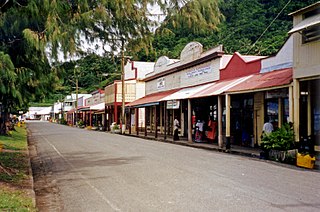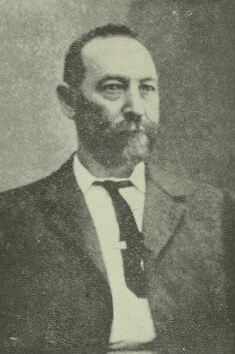Related Research Articles

The first three-quarters of the 19th century were marked by tribal warfare, incursions from neighbouring Tonga, and the increasing encroachment of foreign powers. This period also saw the rise of a warlord by the name of Seru Epenisa Cakobau, who forged the first nation-state covering all of modern Fiji in 1871, before ceding it to the United Kingdom in 1874.

Levuka is a town on the eastern coast of the Fijian island of Ovalau, in Lomaiviti Province, in the Eastern Division of Fiji. Prior to 1877, it was the capital of Fiji. At the census in 2007, the last to date, Levuka town had a population of 1,131, about half of Ovalau's 8,360 inhabitants. It is the economic hub and the largest of 24 settlements on the island. Having been nominated decades prior, Levuka was designated a UNESCO World Heritage Site in June 2013, in recognition of the port town's exceptional testimony to the late colonial port towns in the Pacific.

The Western Division of Fiji is one of Fiji's four divisions. It consists of three provinces in western and northern Viti Levu, namely Ba Province, Nadroga-Navosa Province, and Ra Province. The largest city and capital is Lautoka.

The Eastern Division of Fiji is one of Fiji's four divisions. It consists of Kadavu Province, Lau Province, Lomaiviti Province and Rotuma.

Local elections in Fiji are held for two cities and ten towns. Each city or town has a council comprising between 8 and 20 members, elected for three-year terms, although the government announced legislation on 15 February 2006 to extend the term to four years. Each city or town council elects from among its own members a Mayor for one year. Consecutive terms are permitted.
Matagi, sometimes written Matangi, is an island the Vanua Levu Group in northern Fiji, situated 16°44 South 179° West. It is one of three tiny volcanic islands grouped to the east of Thurston Point on the island of Taveuni, the others being Qamea and Laucala. The horseshoe-shaped islet of 97 hectares lies 10 kilometers (6.2 mi) east of Thurston Point. Inaccessible until recently, this privately owned island has been turned into an up-market resort. Apart from diving, activities include fishing, windsurfing, sailing, water-skiing, and snorkelling. There is a speedboat link between Matagi and Taveuni.

Ovalau is the sixth largest island in Fiji. It is located in Lomaiviti Archipelago. Situated at 17.70° South and 178.8° East,, the island is about 13 kilometers long and 10 kilometers wide. It covers a total area of 106.4 square kilometers and has a population of around 9,100, approximately half of the population of Lomaiviti Province over the 1956–2007 period. Levuka, Fiji's former capital, is the largest of 24 towns and villages on the island, and is the only urban area in Lomaiviti. All settlements are coastal, except Lovoni in the interior of the island.

The Catholic Church in Fiji is part of the worldwide Catholic Church, under the canonical authority and spiritual leadership of the Pope of Rome.
Leonidas was a labour transport ship (schooner) that played an important role in the history of Fiji. She had been earlier used to carry indentured labourers to the West Indies, having transported 580 Indian indentured labourers to St Lucia in 1878. Captained by McLachlan, the ship departed from Calcutta, India on 3 March 1879 and arrived at Levuka, Fiji, on 14 May that year. The indentured labourers who disembarked were the first of over 61,000 to arrive from the Indian subcontinent over the following 37 years, forming the nucleus of the Fiji Indian community that now numbers close to forty per cent of Fiji's population.

The Fiji Football Association is the governing body of football in Fiji. It came into existence in 1961. It is the overseeing body of the Fiji National Team and its leagues.
The history of the Jews in Fiji is intertwined with the settlement of the Fiji islands by European explorers and settlers. Most of these settlers arrive in Fiji via Australia and New Zealand.
Levuka F.C. was a Fijian football team playing in the second division of the Fiji Football Association competitions. It is based in Levuka, which is the only town on Ovalau Island, in the Fiji group. Their home stadium is Nasau Park.
Levuka Airfield is an airport on the island of Ovalau, one of the Lomaiviti Islands in Fiji. Also well known as Bureta Airport, it is located 22 kilometres (14 mi) from the town of Levuka. and operated by Airports Fiji Limited.
The sport of football in the country of Fiji is run by the Fiji Football Association. The association administers the national football team as well as the FPL. The national team has had little international success.

The Sacred Heart Church, also known as the Church of the Sacred Heart or Sacred Heart Catholic Church, is a Roman Catholic church on the Fijian island of Ovalau, situated on Beach Street in the town of Levuka. The church's clock tower serves as a lighthouse to guide the ships to the port through an opening in the reef. The church is part of the heritage status accorded to Levuka by its inscription as a World Heritage Site by UNESCO.

General elections were held in Fiji on 22 March and 8 April 1905.

General elections were held in Fiji on 23 March and 10 April 1908.

Sir John Maynard Hedstrom was a Fijian businessman and politician. He served as a member of the Legislative Council for over 30 years. Alongside Robert Crompton, Henry Marks and Henry Milne Scott, he was one of the 'big four' that heavily influenced the Fijian economy and political sphere in the first half of the 20th century.

Captain David Robbie was a Scottish-born businessman, planter and politician in Fiji. He served as a member of the Legislative Council between 1905 and 1908.
References
- ↑ Levuka at Ethnologue (18th ed., 2015) (subscription required)